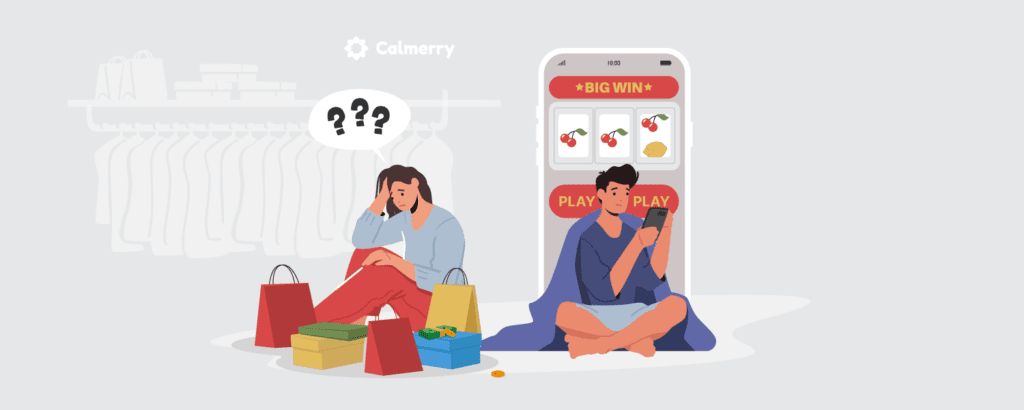Compulsive Gambling Disorder: Symptoms and Causes of Problem Gambling Addiction

In this article
People are naturally drawn to chase luck, but sometimes it turns against them. Gambling has always been alluring, offering the thrill of winning and the promise of quick money. Yet, when losses pile up, many fall into a dangerous cycle, chasing wins that never come.
What starts as casual betting can spiral into an obsession, where the urge to gamble becomes uncontrollable. This is how compulsive gambling disorder may take hold, turning excitement into a destructive habit.
In this article, learn the symptoms of gambling addiction to recognize when a harmless game becomes a serious problem.
What is addiction to gambling?
Gambling disorder (online gambling) is a behavioral addiction where a person cannot resist the uncontrollable urge to keep gambling, despite negative consequences. Unlike casual addicts, problem gamblers continue betting despite mounting debts, strained relationships, and emotional distress.
This is a serious mental health condition recognized by the American Psychiatric Association in the Diagnostic and Statistical Manual (DSM-5) as an impulse-control disorder.
The National Council on Problem Gambling defines it as excessive gambling that disrupts daily life. Over time, gambling becomes an obsession, leading to financial ruin and mental health struggles.
Who is affected by a gambling problem?
Problem gambling can affect anyone, but certain factors increase risk:
- People with a family history of addiction
- Those with coexisting mental health disorders (for example, depression, anxiety, bipolar disorder, obsessive-compulsive disorder)
- Individuals struggling with substance abuse or alcohol addiction
- Those exposed to gambling during childhood
- People who gamble frequently or engage in high-risk types of gambling (for example, sports betting)
How common is excessive gambling?
Gambling disorder affects millions globally and has seen a notable rise in recent years. In the USA, between 1.2% and 6.2% of the population struggles with gambling problems, equating to up to 20 million individuals. [1] Bergman, A. (2025, April 3). 207 Gambling Addiction Statistics & Facts 2025. Quit Gamble. https://quitgamble.com/gambling-addiction-statistics-and-facts/
How is gambling disorder diagnosed?
Gambling disorder is diagnosed based on DSM-5 criteria, requiring at least four of the following symptoms within a year. A mental health professional evaluates gambling patterns, emotional state, and behavior to confirm a diagnosis.
What are the signs and symptoms of gambling addiction?
Recognizing problem gambling early can prevent severe consequences. Here are some of the common key signs of a gambling problem.
Inability to control gambling habits
Repeated failed attempts to stop gambling, increasing bets to feel the same thrill.
Constant urge to gamble despite negative consequences
Gambling may continue even after job loss, debt, or family conflicts.
Lying or hiding gambling activities
Secretive behavior, lying about time and money spent.
Financial and relationship problems caused by gambling
Borrowing money, selling possessions, or stealing to fund bets, neglecting work, family, and social life.
Causes and risk factors
Compulsive gambling is influenced by a variety of factors. Let’s explore some of the key elements that contribute to this issue.
Psychological factors
For many, gambling becomes a way to escape from stress, anxiety, and depression. It can provide a temporary sense of relief or distraction.
People with obsessive-compulsive tendencies might find themselves repeatedly drawn to betting, as it can become a compulsive behavior.
Genetic and biological influences
If there’s a history of addiction in your family, you might be more at risk of developing compulsive gambling habits.
Social and environmental factors
Early exposure to gambling and peer pressure can contribute.
Changes in brain chemistry
Similar to substance abuse, compulsive gambling can alter brain chemistry, making it harder to stop.
Personality traits and coexisting mental health conditions
Impulsivity, competitiveness, and links to conditions like bipolar disorder, ADHD, and alcohol addiction play a role.
Personality traits and coexisting mental health conditions
People with compulsive gambling often have impulsive personality traits and coexisting mental health conditions, including anxiety and impulse-control disorder, bipolar disorder, depression, and alcohol addiction, which can increase their risk of developing a gambling disorder.
What is the gambling addiction treatment?
Effective gambling addiction treatment involves therapy, support groups, and lifestyle changes. There are some disorder treatment options available.
Cognitive behavioral therapy (CBT)
Helps individuals identify triggers, challenge cognitive distortions, and develop healthier responses to gambling.
Motivational interviewing
Encourages commitment to quitting gambling by enhancing motivation and addressing ambivalence.
Psychodynamic therapy
Explores underlying emotional conflicts that may contribute to gambling behavior.
Group therapy
Provides peer support through shared experiences and structured 12-step programs, fostering a sense of community and accountability.
Family therapy
Focuses on repairing relationships, improving communication, and addressing family dynamics affected by gambling.
Can I prevent gambling disorder?
Understanding the risk factors and adopting healthy habits can help reduce your chances of developing this addictive behavior.
Avoiding or limiting gambling behaviors
Setting clear boundaries and avoiding high-risk situations can help you maintain control over gambling habits.
Knowing your family history
Being aware of a family history of addiction may encourage early caution and proactive prevention strategies.
Healthily managing stress
Finding positive coping mechanisms, like exercise or mindfulness, can reduce the urge to gamble as an escape.
What is the prognosis for gambling disorder?
While treating compulsive gambling with therapy and support groups, many people with gambling disorder can recover, but relapse is common without ongoing care. Early intervention improves long-term outcomes significantly.
How can I help myself if I have a gambling disorder?
Seek professional help through therapy or Gamblers Anonymous, and take steps like self-exclusion from casinos to reduce temptation. Financial counseling can also help rebuild stability.
How can I help someone with a gambling disorder?
Offer non-judgmental support and encourage them to contact the National Problem Gambling Helpline or seek therapy. Avoid enabling behaviors like lending money for gambling.
How Calmerry can help with gambling addiction?
Calmerry provides online therapy with licensed professionals specializing in the treatment of gambling disorder, offering flexible support for those struggling to stop gambling. Our CBT-based approach helps address triggers and build healthier habits.
FAQ
What is compulsive gambling?
Compulsive gambling is an impulse-control disorder where people can’t resist the uncontrollable urge to keep gambling despite the toll.
What are the main symptoms of compulsive gambling?
Key signs of gambling include preoccupation with gambling, lying about bets, chasing losses, and failed attempts to stop gambling.
What causes gambling addiction?
Risk factors include genetic predisposition, brain chemistry changes, stress, and coexisting mental health disorders like depression.
Are some people more at risk of developing a gambling addiction?
Yes, people with a family history of addiction, impulse-control disorders, or substance abuse face a higher risk.
How does compulsive gambling affect mental health?
It worsens anxiety and depression, and may trigger suicidal thoughts due to financial and emotional distress.
Can gambling addiction lead to financial and legal problems?
Yes, problem compulsive gamblers often face bankruptcy, debt, or even fraud charges from desperate attempts to fund bets.
Is compulsive gambling linked to other addictions or disorders?
It commonly co-occurs with alcohol addiction, bipolar disorder, and obsessive-compulsive behaviors.
How can someone seek help for gambling addiction?
Contact Gamblers Anonymous, the National Problem Gambling Helpline (1-800-GAMBLER), or seek CBT-based therapy.
- Bergman, A. (2025, April 3). 207 Gambling Addiction Statistics & Facts 2025. Quit Gamble. https://quitgamble.com/gambling-addiction-statistics-and-facts/
online therapy
live video session



